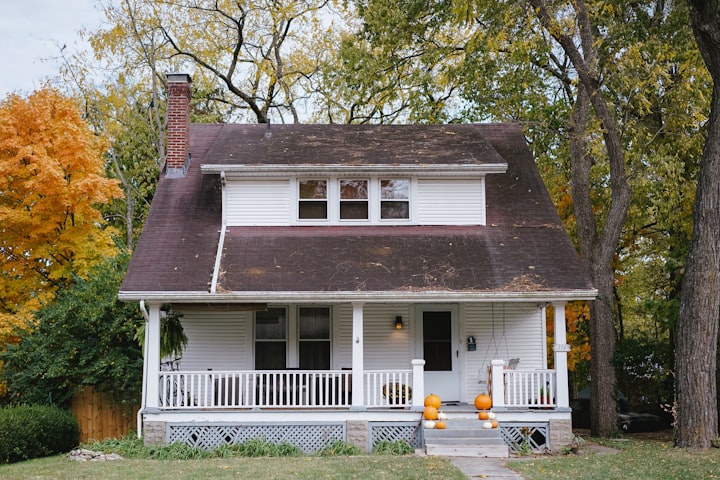Property Investors Are Stealing Young People's Homes and Forcing Them to Rent Forever
Many young people will be forced to endure the uncertainty that comes with renting for the rest of their lives because of greedy property investors.

The woman who showed us around the house put out a cigarette before we walked inside. She had her hair up in a bun and greeted us confidently. We asked her if she was the estate agent. She said no, she was the tenant.
It all felt a bit off. We were here to potentially buy this home and there she was with years of accumulated furniture, bric-a-brac, and memories — and no choice in the matter.
We spoke to the estate agent later and she said the landlord was looking to consolidate his portfolio. He had far too many properties he was renting out and was looking to keep only his most profitable houses. But the home itself was lovely, the estate agent insisted. The lady who lived there with her children absolutely loved it and felt safe and happy — she’d been there for years.
We saw many other houses after this one. But the resigned look on that woman’s face was haunting. She smiled and spoke softly and she welcomed us into her home and showed us her daughter’s room.
A few months later, someone else bought her home.
She didn’t own it so all she could do was leave and find somewhere else to house herself and her children and make memories. For as long as she was allowed to stay anyway.
We are in the middle of a devastating global pandemic that has put people’s lives and income in jeopardy. The economy suffered tremendously and many lost their jobs as governments scrambled to offer stimulus checks and furlough schemes in the midst of growing anger and desperation.
Rather paradoxically, the housing market has flourished while the world around it crumbled. In the United Kingdom, house prices rose by more than 10% since last year — a growing trend that shows little sign of slowing. And in the United States, house prices are rising at the fastest pace in 30 years. Experts say record-low mortgage rates coupled with dwindling supply are to blame.
But there is an underlying reason for this shortage in homes. It is an insidious festering sore that has infected young people’s lives for decades — the property investor.
“Generation Rent” isn’t just an ironic statement
There are luxurious developments with cinemas and well-being centres in London. Retailer John Lewis is planning on building 10,000 rental homes furnished with upmarket furniture from its stores. All its rentals will come with concierge service too. And real estate fund management firms are getting together to buy up thousands of homes just so they can rent them out.
So what if you can’t hang a picture, paint the walls, or buy a pet without grovelling to your landlord? So what if you’re constantly walking on eggshells worried that you will damage the tiny flat you’re paying extortionate rent for and lose your deposit? So what if your landlord can raise your rent or pretty much kick you out whenever? At least you’ll have a wellness centre on-site and fancy furniture to cry on too.
God knows you’ll need it when you realise just how much money you’ve wasted renting a rabbit hatch in some upmarket part of the city. And that’s assuming you can afford the extortionate rates and the bedsit with the “wellness centre”.
“Every time property investors purchase a property with the sole intention of renting it out, they are taking that house away from a young person who may have benefited from homeownership.”
Some experts say renting is the future. More and more people will turn to private renting as house prices rise and buying becomes impossible. This lack of choice is not a good thing nor is it inevitable.
Investors are buying up our homes and treating them like stocks while we’re left with nothing
In the UK, estimates suggest that around 6% of the available land has been built on. Property developers look at this figure and think to themselves — that leaves more than 90% of land to develop. This, of course, presupposes that we will not need any land for things like farming or hiking or just general enjoyment.
Property developers are on to something though — housing supply can’t keep up with housing demand. The housing stock is actually running out in the same way loo roll was scarce in the early days of the pandemic. Houses are going up slower than the population that wishes to purchase a home.
But that’s not because there are so many prosperous, young people looking for a starter home and the certainty it provides. Oh no. What is happening is far more insidious and needs weeding out the same way Japanese Knotweed does before boomers put their homes up for sale and rake it in. No offence, boomers.
In the UK, 12% of mortgages are taken out for buy-to-let properties. Last year, 64,500 mortgages were taken out to finance rental homes. This was at the height of the pandemic when many people struggled to pay rent and keep their jobs.
This number only accounts for property investors who took out mortgages to fund their investments. It does not account for cash buyers who bought the properties they’re renting out.
Every time property investors purchase a property with the sole intention of renting it out, they are taking that house away from a young person who may have benefited from homeownership.
These buy-to-let properties tend to be starter homes. They are small, terraced houses that a young family might buy to get their foot on the housing ladder. Instead, they are bought up by property investors who rent them out at extortionate rates to the young family that then struggle to save up enough for a deposit. And so it goes.
And this is not to say that everyone should own their home and nobody should ever have to rent. But private renting has doubled over the last two decades and it is accelerating exponentially. In 1997, about 10% of households in the UK rented their homes. By 2007, this figure had risen to a modest 12%. But by 2018, the percentage of people renting soared to 20%.
Some property investors treat homes like stocks. They buy them, keep them empty and pristine, and sell them on years later to make a profit. These property investors reason that upmarket buyers don’t want a used home any more than they wish to buy a used Aston Martin.
It is estimated that there are almost 270,000 empty homes in England currently. This represents a 19% increase from 2019. The number has been on the rise for the last four years. Meanwhile, there are an estimated 280,000 homeless people in England — and this number is on the rise too.
Young people will be forced to work their way to their graves just to keep a roof over their head
Whether to rent or buy is a personal choice. Some people choose to rent forever and they have their reasons. But even the staunchest rent defender can’t deny that homeownership provides certainty that renting simply cannot. Once you own your home outright, it is highly unlikely that it will be taken from you.
If you rent, your rent can go up or your landlord can decide to kick you out — either because they want to move in themselves or because they want to trim their portfolio a little.
But young people don’t have a choice in the matter. While property houses are rising, salaries are stagnating. Properties in the UK now cost, on average 7 times the average salary. In London and the South East, they cost a staggering 27 times the average salary in those areas. In 1990, the median London property cost about four times the average salary in the area. Hardly an issue resolved by buying less smashed avocado toast.
Young people are facing an impossible situation — they can’t afford to buy because mortgage lenders tend to let you borrow only about 4.5 times your annual income, they can’t save because the average rent sets them back £870 per month when the average monthly salary is £1950 before tax.
A recent poll revealed that 67% of Generation Z respondents and 52% of Millenials plan to delay their retirement as they don’t believe they will live comfortable lives. Given that the current average pension pot in the UK provides retirees with £12,000 per year, it is not surprising that those who do not own a home or have been unable to pay off their home would fear life after work.
The situation is untenable for many young people whose only realistic option is to rent forever. But the fight isn’t lost yet. There are ways young people can drive change and fight for options.
The government has introduced some policies to help young people get on the housing ladder if they choose to do so. But efforts so far have been largely superficial and beneficial for only a select few who are able to save substantially.
House prices are rising at record levels and quickly pricing people out of the market and dooming them to uncertainty and renting. Unless the government adopts policies that make empty second homes and large property portfolios less attractive, this issue will continue to spiral and young people will continue to have their choices taken away from them.
About the Creator
Stela Gineva
Stela is a first-generation immigrant and content creator living in the United Kingdom. She worked in regional journalism before she moved to the public engagement field within clinical research.






Comments
There are no comments for this story
Be the first to respond and start the conversation.